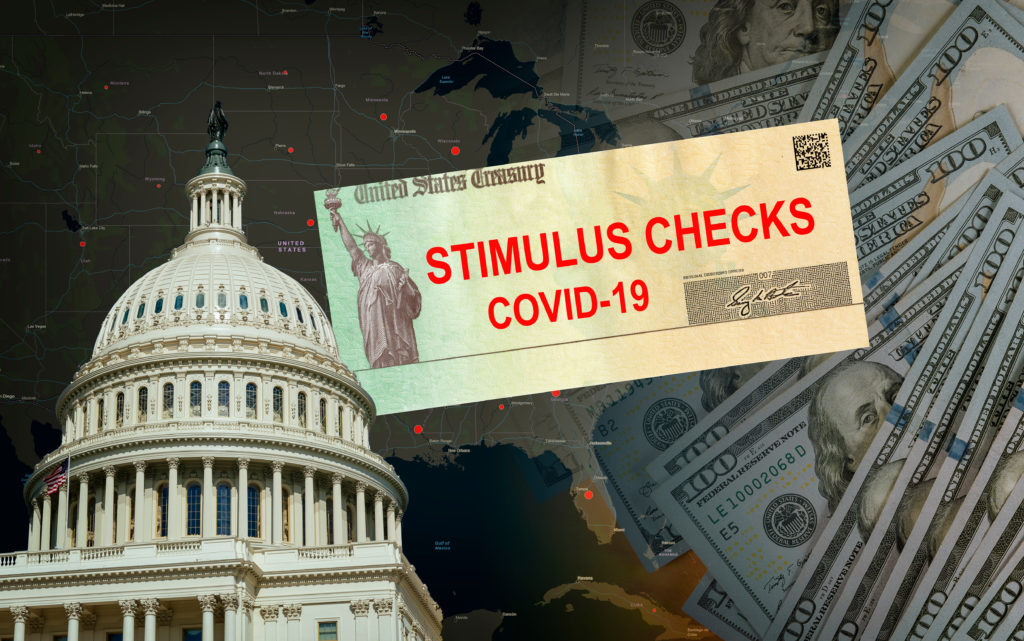COVID-19 Stimulus Round 4, which plan will go into effect?

COVID-19 Stimulus Round 4, which plan will go into effect? Many people have been looking forward to the government’s next round of COVID-19 stimulus– sadly, the fourth wave of COVID-19 relief and the laws around it have become highly politicized and appear to be caught in gridlock between the House and Senate.
While both Republicans and Democrats appear to support additional $1,200 economic impact payments, an extension of unemployment and expansion of the Payroll Protection Program, the common ground seems to crumble along with the details of rolling it out.
CARES vs. Heroes vs. HEALS Acts: What’s the difference?[1]
| CARES (from March) | Heroes (Democratic) | HEALS (Republican) | |
| Total cost of stimulus package | $2.2 trillion | $3 trillion | $1 trillion |
| Stimulus check maximum payment amount | $1,200 to single filers earning under $75K per year, $2,400 for joint filers under $125K. Reduced $5 per $100 of income above limits. | Same as CARES. | Same as CARES. |
| How much stimulus money you get for dependents | $500 for dependents, 16 and under. College students, 24 and under, are not eligible. | $1,200 for dependents, maximum of three. | $500 for dependents, no age limit. |
| Enhanced unemployment benefit | $600 per week in addition to state benefits. | Same as CARES. | Initially $200 per week. Then up to $500 per week to match 70% of lost wages when added to state benefits. |
| How long enhanced unemployment lasts | Expires July 31. | January 2021 for most workers, through March 2021 for gig workers, independent contractors, part-time workers and self-employed. | $200 per week bonus through September. Then 70% matching of lost wages. Extends expiration of federal benefits until Dec. 31. |
| Paycheck Protection Program | Allocated $659 billion total in forgivable loans for small businesses, who must use 75% on payroll to be eligible for forgiveness. $130 billion remains, but expires Aug. 8. | Expands eligibility, eliminates 75% payroll requirement and extends application period to Dec. 31. | Injects another $190 billion into the PPP fund, expands eligibility and allows businesses to request a second loan. Eliminates 75% payroll requirement and expands approved uses of funds for loan forgiveness. |
| Employee tax credit | Tax credit on 50% of up to $10,000 in wages. | Increases tax credit to 80% of up to $15,000 in wages. | Increases tax credit to 65% of up to $30,000. |
| Bonus for employees who start new jobs or are rehired | Does not address. | Does not address. | There could be a return-to-work bonus of up to $450 per week for unemployed workers who secure a new job or are rehired. |
| Eviction protections and moratorium | Bans late fees until July 25 and evictions until Aug. 24 on properties backed by federal mortgage programs (Fannie Mae, etc.) or that receive federal funds (HUD, etc.). | Expands to cover nearly all rental properties in the US, extends eviction moratorium an additional 12 months, allocates $200 billion for housing programs and another $100 billion for rental assistance. | Does not address. |
| School reopening | Does not address. | $58 billion for grades K-12, $42 billion for higher education. | $70 billion to K-12 that open for in-person classes, $29 billion for higher education, $1 billion to Bureau of Indian Education, $5 billion state discretion. |
| Liability protection from coronavirus illness | Does not address. | Does not address. | 5 year liability shield to prevent schools, businesses, hospitals, from being sued over coronavirus-related issues. |
| Coronavirus testing | Does not address. | Does not address. | $16 billion. |
The President’s Option
As the House and Senate continue to bash heads, the President waits for something to sign. If a solution is not reached soon, he’s also floated the idea of unilaterally enacting his own relief packages. “A lot of people are going to be evicted, but I’m going to stop it, I’ll do it myself if I have to”, “I have a lot of powers with respect to executive orders, and we’re looking at that very seriously right now.”[2] Not only would the president’s executive order focus on an eviction moratorium but would focus on payroll tax holiday as well.
Halting payroll taxes would increase each employee’s take home pay by 7.65% immediately. Businesses would also save 7.65% of their current payroll costs. Small businesses would have a huge boost as self-employed individuals would increase their take home pay effectively by 15.3%.[3]
Despite the President’s claims that he has the authority to create a payroll tax holiday, it has not been met without opposition. Traditionally Congress is the one that has the responsibility to create and repeal taxes; however, the President does have the authority to postpone the collection of tax.[4] We saw this once already as the April 15th filing deadline was pushed back into July this year. Regarding the President’s ability to postpone tax deadline, (including payroll tax), Economist Stephen Moore says “This was put in the tax code as an emergency procedure… The President has the unquestionable authority, not to cancel a tax, but to suspend the payment of the tax until the crisis is over.” Moore also suggests that the President could forgive the tax at the end of the suspension period.[5]
We leave it to you, which solution do you feel would work the best?
About Us
 We hope you found this article about COVID-19 stimulus round 4, which plan will go into effect helpful. If you have questions or need expert tax or family office advice that’s refreshingly objective (we never sell investments), please contact us or visit our Family office page or our website at www.GROCO.com. Unfortunately, we no longer give advice to other tax professionals gratis.
We hope you found this article about COVID-19 stimulus round 4, which plan will go into effect helpful. If you have questions or need expert tax or family office advice that’s refreshingly objective (we never sell investments), please contact us or visit our Family office page or our website at www.GROCO.com. Unfortunately, we no longer give advice to other tax professionals gratis.
To receive our free newsletter, contact us here.
Subscribe to our YouTube Channel for more updates.
Considerately yours,
GROCO, GROCO Tax, GROCO Technology, GROCO Advisory Services, GROCO Consulting Services, GROCO Relationship Services, GROCO Consulting/Advisory Services, GROCO Family Office Wealth, and GROCO Family Office Services.
[1] https://www.cnet.com/personal-finance/heals-vs-cares-vs-heroes-stimulus-packages-key-differences-between-democratic-and-republican-proposals/
[2] https://www.foxbusiness.com/economy/trumps-weighs-executive-action-to-suspend-evictions-payroll-tax
[3] https://www.irs.gov/taxtopics/tc751
[4] https://www.irs.gov/pub/irs-drop/rp-01-53.pdf
[5] https://video.foxnews.com/v/6178164298001#sp=show-clips
GROCO is a proud sponsor of the:

5 Best and Worst States for Wealthy Retirees
Determining The Best & Worst States for Wealthy Retirees Can be Subjective Retirement marks a significant phase in life, offering a new world of opportunities and choices. One critical decision for affluent retirees is selecting the right state to enjoy their golden years. In this post, we’ll explore the 5 best and worst states for…
Chris Maxson Ignites Fireplace Innovation
Chris Maxson, owner of Acucraft Fireplace Systems and Managing Partner, Maxson family’s business ventures discusses igniting innovation in the fireplace industry with Alan Olsen. Below are some of the key aspects of Chris Maxson’s influence on the fireplace industry and his unique approach with Acucraft Fireplace Systems. They indicate the rich legacy and innovation themes discussed.…
14 Best Accounting Jokes and Financial Humor
The Best Accounting Jokes for Financial Experts in 8 Laughs & Ledgers: Welcome to the lighter side of accounting! Yes, you read that right. While debits, credits, and balance sheets are serious business, who says accountants can’t have a sense of humor? Today, we’re diving into the funniest accounting jokes that even your auditor can’t…




